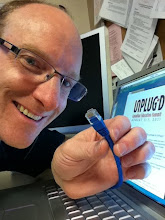Monty Python news announcer
That frigid temperature embracing much of North America is emblematic of the cold clutch that has allowed written exams to hold on as the preeminent measure of student learning in this part of the world.
My more northern colleague and fellow Canadian, Clarence Fisher opened the door to the archane practice of assessing student learning by formal examination:
"How to design a test for each of the four subject areas that I am required to host exams for (Language Arts, Social Studies, Science and Math) that is fair and that encapsulates a lot of what we have done to this point in the school year?"
While not overtly considered by many in the blogosphere, the widespread understanding that students need to be doing work that is relevant, and that employs a wide variety of communications technologies, assures me that many of today's educators understand the importance of creating rich learning experiences. What is less clear, is how effective teachers can be in assessing the learning that takes place in light of the differentiated products many of todays students have the liberty to create.
 Exam 2.0 should be unrecognizable from exams today (and exams yesterday). The idea that students can demonstrate their learning of course content by recording what they can recall, is antiquated at best and fails to recognize the world inhabited by present and future citizens.
Exam 2.0 should be unrecognizable from exams today (and exams yesterday). The idea that students can demonstrate their learning of course content by recording what they can recall, is antiquated at best and fails to recognize the world inhabited by present and future citizens. When exams become authentic responses to real world problems or scenarios that allow students to use a wide range of tools, educators will be able to assess not only student learning, but will gain great insight into the relevance of the course(s) taught.
If teachers are interested in exploring assessment alternatives, the range of possibilities offered in the WebQuest model are highly recommended. Just as an employer should be able to provide feedback to members of a team, an attentive teacher can use WebQuests or other rich performance tasks to gauge student learning... especially when such tasks call for students to develop products through the application of previously taught essential skills.
I'll have more to say on this topic on Tuesday morning's Teacher 2.0 podcast.




0 comments:
Post a Comment